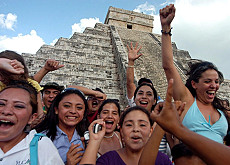
New Seven Wonders of the World named

The Great Wall of China and India's Taj Mahal are among landmarks chosen in a global vote as the new Seven Wonders of the World, say the Swiss organisers.
The seven sites were announced in a glittering and star-studded ceremony in Lisbon, Portugal, after a reputed 100 million people cast their ballots via internet or by phone.
Machu Picchu in Peru, Brazil’s Statue of Christ the Redeemer, the Colosseum in Rome, the Mayan ruins at Chichen Itza in Mexico and Jordan’s Petra also made the list.
They beat 14 other nominated landmarks, which included the Eiffel Tower, the Statue of Liberty and the Sydney Opera House.
The only Swiss candidate for the world wonders, the Chapel Bridge in Lucerne, failed to make it into the top 21.
The vote, said to be the largest ever of its kind, was organised by the Zurich-based non-profit organisation, New7Wonders.
“Never before in history have so many people participated in a global decision,” US actress Hilary Swank said at the presentation on Saturday evening.
The Seven Wonders of the Ancient World were selected by the Greek philosopher Philon more than 2,000 years ago.
The Pyramids of Giza are the only one of the original wonders still standing. They have been given honorary status in addition to the new seven wonders after Egyptian officials complained it was undignified that the pyramids had to compete in an online poll.
Swiss man’s dream
The campaign to name the new wonders was launched by Swiss adventurer Bernard Weber in 1999. Almost 200 nominations came in and the list was narrowed to 21 at the beginning of 2006.
For inclusion in the list, the new wonders had to be man-made, completed by 2000 and in an “acceptable” state of preservation.
Each continent had to be represented by at least one wonder, but there could not be more than one per country. The ancient wonders were mainly concentrated in the Mediterranean area.
“They should become symbols of unity in the modern world, just as the original seven wonders were symbols of the ancient world,” Weber told swissinfo in an earlier interview.
Some countries, such as Brazil and Jordan, had enthusiastically endorsed their country’s candidates.
Objections
But the new wonders campaign has not been universally recognised. The United Nations’ cultural organisation, Unesco, has distanced itself from the initiative. It has its own World Heritage list.
“There is no comparison between Mr Weber’s mediatised campaign and the scientific and educational work resulting from the inscription of sites on Unesco’s World Heritage List,” said Unesco in a statement released on July 6.
“The list of the “Seven New Wonders of the World” will be the result of a private undertaking, reflecting only the opinions of those with access to the internet and not the entire world. This initiative cannot, in any significant and sustainable manner, contribute to the preservation of sites elected by this public,” it added.
Archaeologists have also raised concerns over the possible effects of increased tourism to the new seven wonders.
Weber’s foundation, which relies on private donations and revenue from selling broadcasting rights, says it will use half its funds for restoration efforts worldwide.
This includes recreating the Bamiyan Buddha statues in Afghanistan, which were destroyed by the Taliban in 2001.
swissinfo with agencies
The Great Wall of China
The Taj Mahal, in India
Machu Picchu, in Peru
The statue of Christ the Redeemer, in Brazil
The Colosseum, in Italy
The Mayan ruins at Chichen Itza, in Mexico
Petra, in Jordan
The Hanging Gardens of Babylon
Statue of Zeus at Olympia
Temple of Artemis at Ephesus
Mausoleum of Halicarnassus
Colossus of Rhodes
Pharos lighthouse off Alexandria
The Great Pyramids of Giza

In compliance with the JTI standards
More: SWI swissinfo.ch certified by the Journalism Trust Initiative






























You can find an overview of ongoing debates with our journalists here . Please join us!
If you want to start a conversation about a topic raised in this article or want to report factual errors, email us at english@swissinfo.ch.